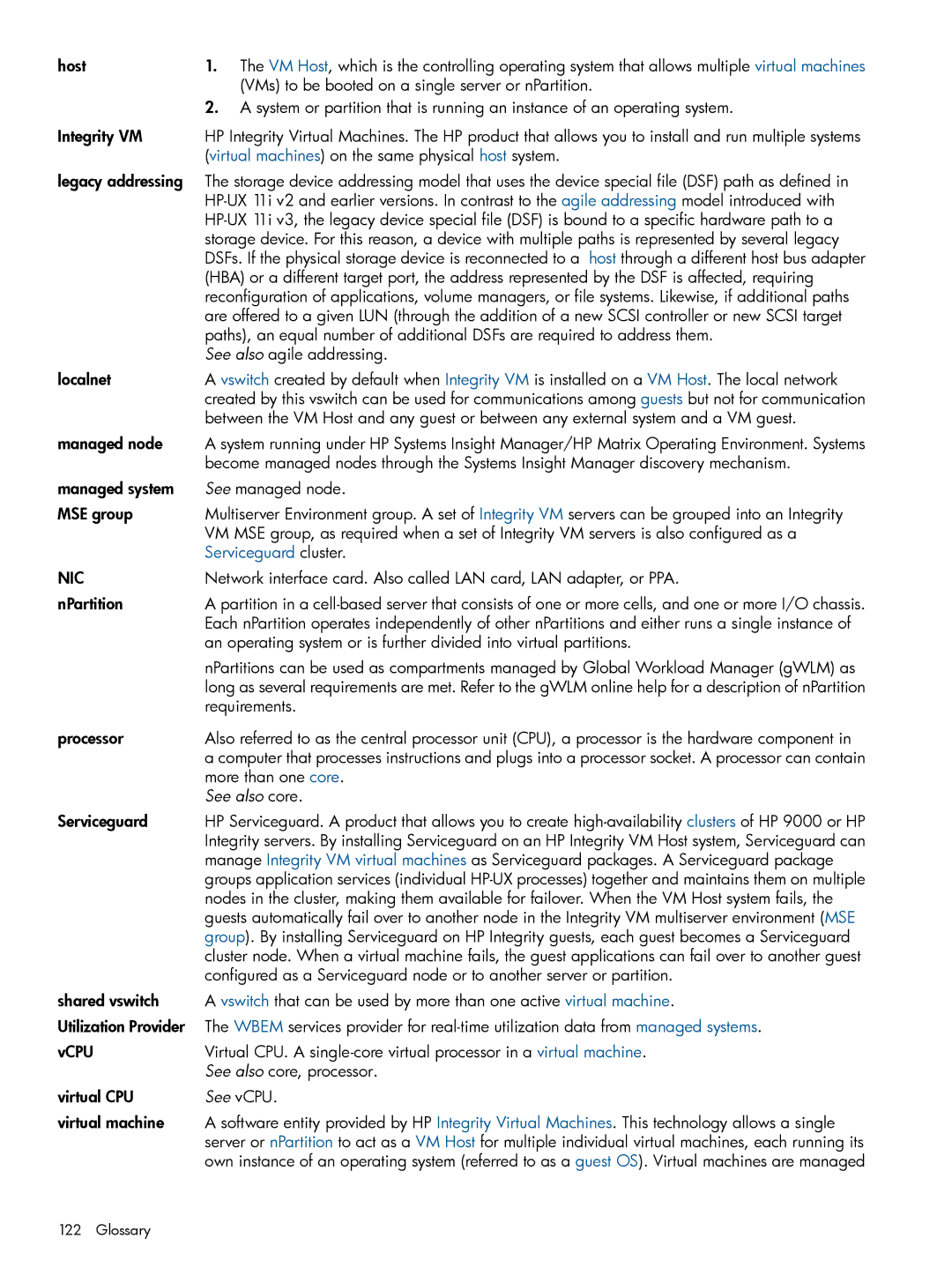host | 1. The VM Host, which is the controlling operating system that allows multiple virtual machines |
| (VMs) to be booted on a single server or nPartition. |
| 2. A system or partition that is running an instance of an operating system. |
Integrity VM | HP Integrity Virtual Machines. The HP product that allows you to install and run multiple systems |
| (virtual machines) on the same physical host system. |
legacy addressing | The storage device addressing model that uses the device special file (DSF) path as defined in |
| |
| |
| storage device. For this reason, a device with multiple paths is represented by several legacy |
| DSFs. If the physical storage device is reconnected to a host through a different host bus adapter |
| (HBA) or a different target port, the address represented by the DSF is affected, requiring |
| reconfiguration of applications, volume managers, or file systems. Likewise, if additional paths |
| are offered to a given LUN (through the addition of a new SCSI controller or new SCSI target |
| paths), an equal number of additional DSFs are required to address them. |
| See also agile addressing. |
localnet | A vswitch created by default when Integrity VM is installed on a VM Host. The local network |
| created by this vswitch can be used for communications among guests but not for communication |
| between the VM Host and any guest or between any external system and a VM guest. |
managed node | A system running under HP Systems Insight Manager/HP Matrix Operating Environment. Systems |
| become managed nodes through the Systems Insight Manager discovery mechanism. |
managed system | See managed node. |
MSE group | Multiserver Environment group. A set of Integrity VM servers can be grouped into an Integrity |
| VM MSE group, as required when a set of Integrity VM servers is also configured as a |
| Serviceguard cluster. |
NIC | Network interface card. Also called LAN card, LAN adapter, or PPA. |
nPartition | A partition in a |
| Each nPartition operates independently of other nPartitions and either runs a single instance of |
| an operating system or is further divided into virtual partitions. |
| nPartitions can be used as compartments managed by Global Workload Manager (gWLM) as |
| long as several requirements are met. Refer to the gWLM online help for a description of nPartition |
| requirements. |
processor | Also referred to as the central processor unit (CPU), a processor is the hardware component in |
| a computer that processes instructions and plugs into a processor socket. A processor can contain |
| more than one core. |
| See also core. |
Serviceguard | HP Serviceguard. A product that allows you to create |
| Integrity servers. By installing Serviceguard on an HP Integrity VM Host system, Serviceguard can |
| manage Integrity VM virtual machines as Serviceguard packages. A Serviceguard package |
| groups application services (individual |
| nodes in the cluster, making them available for failover. When the VM Host system fails, the |
| guests automatically fail over to another node in the Integrity VM multiserver environment (MSE |
| group). By installing Serviceguard on HP Integrity guests, each guest becomes a Serviceguard |
| cluster node. When a virtual machine fails, the guest applications can fail over to another guest |
| configured as a Serviceguard node or to another server or partition. |
shared vswitch | A vswitch that can be used by more than one active virtual machine. |
Utilization Provider | The WBEM services provider for |
vCPU | Virtual CPU. A |
| See also core, processor. |
virtual CPU | See vCPU. |
virtual machine | A software entity provided by HP Integrity Virtual Machines. This technology allows a single |
| server or nPartition to act as a VM Host for multiple individual virtual machines, each running its |
| own instance of an operating system (referred to as a guest OS). Virtual machines are managed |
122 Glossary
